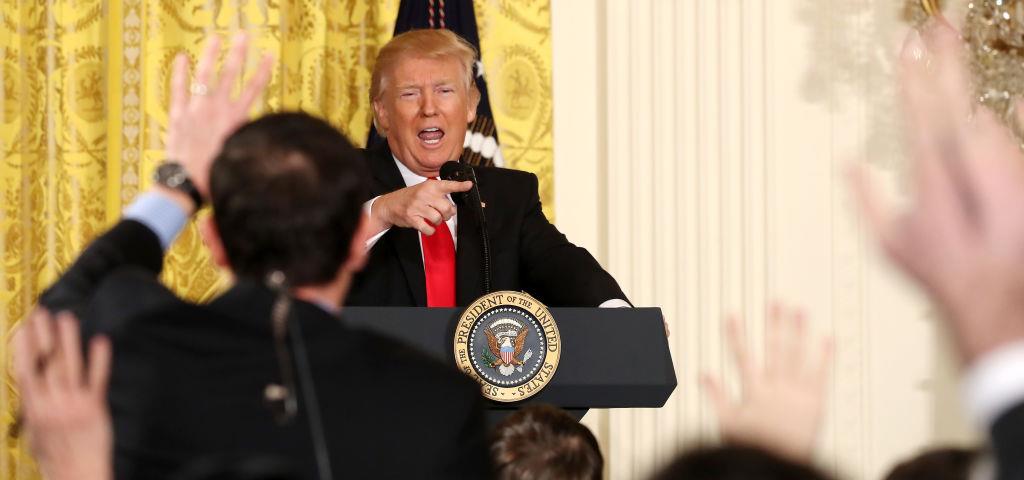
Trump clearly values unpredictability as a means to keep rivals off-guard . And t hose living outside the United States , notes Paul Saunders, will have to work considerably harder to evaluate American politics .
* * *
Following President Donald Trump’s historic election victory, many outside the United States find America much more difficult to understand. It is. Some of this is a result of Mr. Trump’s approach to governance—but a great deal of the challenge is a product of American media coverage of the election campaign and the new Trump administration. Those living outside the United States will have to work considerably harder in the coming months and years to evaluate American politics and to predict American policy.
President Trump clearly values unpredictability as a means to keep America’s rivals and foes, his political opponents and the media off-guard. During the election campaign and since becoming president, he has regularly criticized past American foreign policy for its predictability and has argued that announcing US plans well in advance has at times undermined their success. Mr. Trump explained his approach most recently in his February 16 press conference, stating that “I don’t have to tell you what I’m going to do in North Korea. And I don’t have to tell you what I’m going to do with Iran. You know why? Because they shouldn’t know.” [ https://www.whitehouse.gov/the-press-office/2017/02/16/remarks-president-trump-press-conference ] While US allies may find this confusing at times, it is a logical and sensible approach that may contribute to US efforts at deterrence. Mr. Trump’s approach forces American adversaries to think twice about how Washington might respond to their behavior.
At the same time, Mr. Trump has starkly signaled his desire to break with many past US policies, both domestic and foreign. This has so far been most dramatic in the administration’s approach to immigration—where President Trump has expressed his strong commitment to combating illegal immigration and tightening national security screening at US borders (which he terms “extreme vetting” [ https://www.whitehouse.gov/the-press-office/2017/02/16/remarks-president-trump-press-conference ])—and in US policy toward Russia, which the President has described as a potential partner in fighting terrorism. This magnifies the uncertainty that many feel, in that President Trump has suggested that he may discard past conventional wisdom without fully elaborating how he intends to do so (and apparently omitting at least some of these details deliberately).
Unexamined Assumptions
No less important, however, is the American media’s broad failure in covering Mr. Trump, his campaign, and his first weeks in office. While some outlets and some individual journalists have been more serious and more effective than others, few if any accurately assessed the level of support behind the Trump campaign. Indeed, the day before the election, the New York Times assigned 85% probability to a Hillary Clinton victory using a statistical model that incorporated state and national polls. [ https://www.nytimes.com/interactive/2016/upshot/presidential-polls-forecast.html?_r=0 ] This and other flawed projections seem to rest in no small part on unexamined assumptions about polling, skepticism if not antipathy in elite coastal media toward the Trump campaign and Donald Trump personally, and superficial analysis of Secretary Clinton’s weaknesses as a candidate. Mr. Trump’s victory was so surprising precisely because of the American media’s inadequate campaign coverage, which led many others (erroneously) to doubt his chances to win. In theory, this could even have suppressed the vote among weaker Trump supporters, who may have developed a sense of futility.
It is interesting to consider to what extent this was in fact a deliberate choice, at least for some individuals. During the presidential campaign, a New York Times media columnist publicly declared that reporters need no longer apply “normal” journalistic standards in covering Mr. Trump because he was uniquely threatening to America and must be stopped. [ https://www.nytimes.com/2016/08/08/business/balance-fairness-and-a-proudly-provocative-presidential-candidate.html ]
This view—which many mainstream journalists appear to have shared—appears to have relied upon a foundational assumption that the media could successfully prevent Donald Trump’s election. Few appear to have thought seriously about the consequences of this approach should he prevail despite open and overwhelming opposition from the New York Times and other leading media organizations. Most obviously, a successful President Trump could justifiably view journalists and editors who knowingly suspended journalistic standards to oppose him as political opposition rather than neutral observers and interpreters of political life.
Setting aside its implications inside America, the approach that many media organizations have taken in covering Mr. Trump creates big problems for foreign governments, experts, and others trying to understand the United States and its politics and policy. Most obviously, it is no longer possible to view the New York Times , the Washington Post , and some other previously trusted media as sources of impartial and accurate information about the Trump administration, domestic support or opposition to its policies, or even what administration policy actually is.
From an analytical perspective, outlets like these increasingly reflect a particular political point-of-view. This has been perhaps most confusing for anyone trying to assess the Trump administration’s nascent policy toward Russia, which seems to have become more bitterly politicized than any other foreign policy issue in the post-Cold War era—and for less reason, since the administration has done nothing yet beyond conducting its first meetings and telephone conversations with Russian officials.
As a result, those using mainstream media to try to understand America can do so only by filtering their reporting and pronouncements, carefully examining the facts presented and omitted, and comparing the result with what appears in sources more sympathetic to the administration. This is not an impossible task, but it is something that requires conscious, disciplined, and intellectually rigorous effort. Anyone who does not do this risks major mistakes in predicting US foreign policy conduct.
